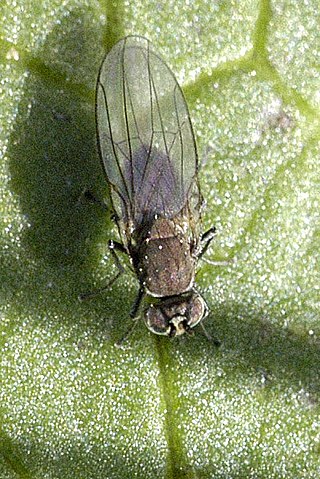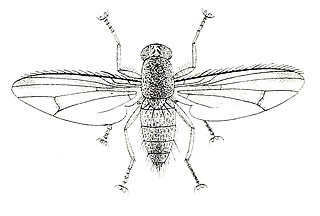
Ephydridae is a family of insects in the order Diptera.

The Lauxaniidae are a family of acalyptrate flies. They generally are small flies with large compound eyes that often are brightly coloured in life, sometimes with characteristic horizontal stripes, such as in Cestrotus species. Many species have variegated patterns on their wings, but in contrast they generally do not have variegated bodies, except for genera such as Cestrotus, whose camouflage mimics lichens or the texture of granitic rocks.

The Curtotonidae or quasimodo flies are a small family of small grey to dark brown humpbacked flies (Diptera) with a worldwide distribution, but with very few species in the Nearctic, Australasian/Oceanian, and Palaearctic regions. Most members of the family are found in tropical to subtropical latitudes in Africa and the Neotropics. Many remain undescribed in collections, since little work on the family has been done since the 1930s.

Canacidae, incorrectly Canaceidae, or beach flies, surf or surge flies, is a family of Diptera. As of 2010, 307 species in 27 genera. The family now includes Tethininae as a subfamily.

Clusiidae or "druid flies" is a family of small, thin, yellow to black acalyptrate flies with a characteristic antenna and with the wing usually partially infuscated. They have a cylindrical body. The head is round, the vertical plate reaches the anterior margin of the frons and the vibrissae on the head are large. The costa is interrupted near subcosta and the latter developed throughout length. Larvae are found in the bark of trees, the flies on trunks. The larvae are notable for their ability to jump. Males of many species in the subfamily Clusiodinae have been observed while engaged in lekking behaviour. There are hundreds of species in 14 genera found in all the Ecoregions, although most species occur in tropical regions. The type genus is Clusia Haliday, 1838.

The Celyphidae, commonly known as beetle flies or beetle-backed flies, are a family of flies. About 115 species in about 9 genera are known chiefly from the Oriental and Afrotropic biogeographic regions with one lineage in the New World.

Mesembrinella caenozoica is an extinct species of blow fly in the family Mesembrinellidae. The species is solely known from the Middle Miocene Dominican amber deposits on the island of Hispaniola.

Mesembrinellidae is a family of Neotropical flies in the order Diptera, and formerly included in the Calliphoridae. There are 36 described species.

Mesembrinella is a genus of Neotropical flies in the family Mesembrinellidae, and formerly placed in the Calliphoridae.

Mesembrinellinae is a subfamily of Neotropical flies in the order Diptera, and formerly included in the Calliphoridae. There are 33 described living species.
Mesembrinella spicata is a species of fly in the family Mesembrinellidae.
Laneella is a genus of flies in the family Mesembrinellidae.
Laneellinae is a subfamily of Neotropical flies in the family Mesembrinellidae, and formerly placed in the Calliphoridae.
Mesembrinella socors is a species of fly in the family Mesembrinellidae.
Mesembrinella randa is a species of fly in the family Mesembrinellidae.
Mesembrinella cyaneicincta is a species of fly in the family Mesembrinellidae.
Mesembrinella aeneiventris is a species of fly in the family Mesembrinellidae.
Souzalopesiella is a genus of flies in the family Mesembrinellidae.
Laneella fuscosquamata is a species of fly in the family Mesembrinellidae.
Laneella perisi is a species of fly in the family Mesembrinellidae.







